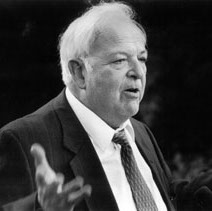A Quote by Kenneth Arrow
There are all sorts of institutions in the economic world which depart from the simple price/market model which I worked on in an earlier incarnation and which has been sort of the mainstream of economic theories since Adam Smith and David Ricardo. There are all sorts of contractual relations between firms and individuals which do not conform to the simple price theory - profit-sharing schemes and so forth - and the explanation for these suddenly became clear. We now understand why these emerged and that they are based on differences in information in the economy.
Quote Topics
Adam
Based
Became
Been
Between
Clear
Conform
David
Depart
Differences
Earlier
Economic
Economy
Emerged
Explanation
Forth
Incarnation
Individuals
Information
Institutions
Mainstream
Market
Model
Now
Price
Profit
Relations
Schemes
Sharing
Simple
Since
Smith
Sort
Suddenly
Theories
Theory
Understand
Which
Why
Worked
World
Related Quotes
Some people continue to defend trickle-down theories which assume that economic growth, encouraged by a free market, will inevitably succeed in bringing about greater justice and inclusiveness in the world. This opinion, which has never been confirmed by the facts, expresses a crude and naive trust in the goodness of those wielding economic power and in the sacralized workings of the prevailing economic system.
LABOUR, like all other things which are purchased and sold, and which may be increased or diminished in quantity, has its natural and its market price. The natural price of labour is that price which is necessary to enable the labourers, on with another, to subsist and to perpetuate their race, without either increase or diminution.
For 60 years, since World War II, we have been trying to create a rules-based system, a global economic system. We understand that what makes our economy function is what we call the rule of law, and what is true domestically is also true internationally. It is important to have rules by which we govern our relations with other countries.
Henceforth, whilst there are a great many theories and models proposed as to how, or why, magic works (based on subtle energies, animal magnetism, psychological concepts, quantum theory, mathematics or the so-called anthropomorphic principle) it is not a case that one of them is more 'true' than others, but a case of which theory or model you choose to believe in, or which theory you find most attractive. Indeed, from a Chaos Magic perspective, you can selectively believe that a particular theory or model of magical action is true only for the duration of a particular ritual or phase of work.
Adam Smith's image of competition in the marketplace was intended as an adjunct to his detailed description of human motivation in The Theory of Moral Sentiments , in which the pursuit of profit is tempered at every juncture by sympathy and benevolence, and by the posture of the "impartial spectator" which is forced on us by our moral nature.
































